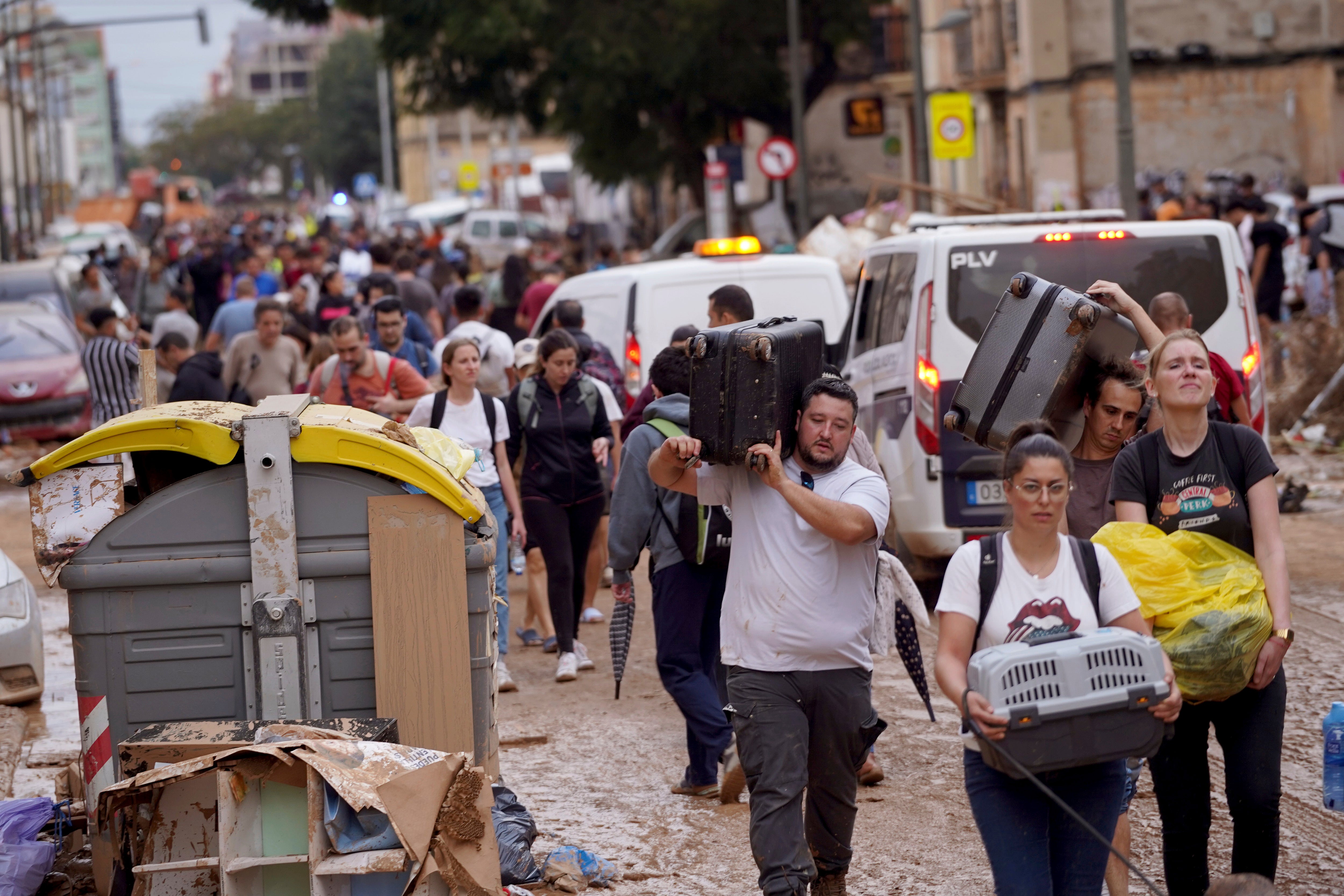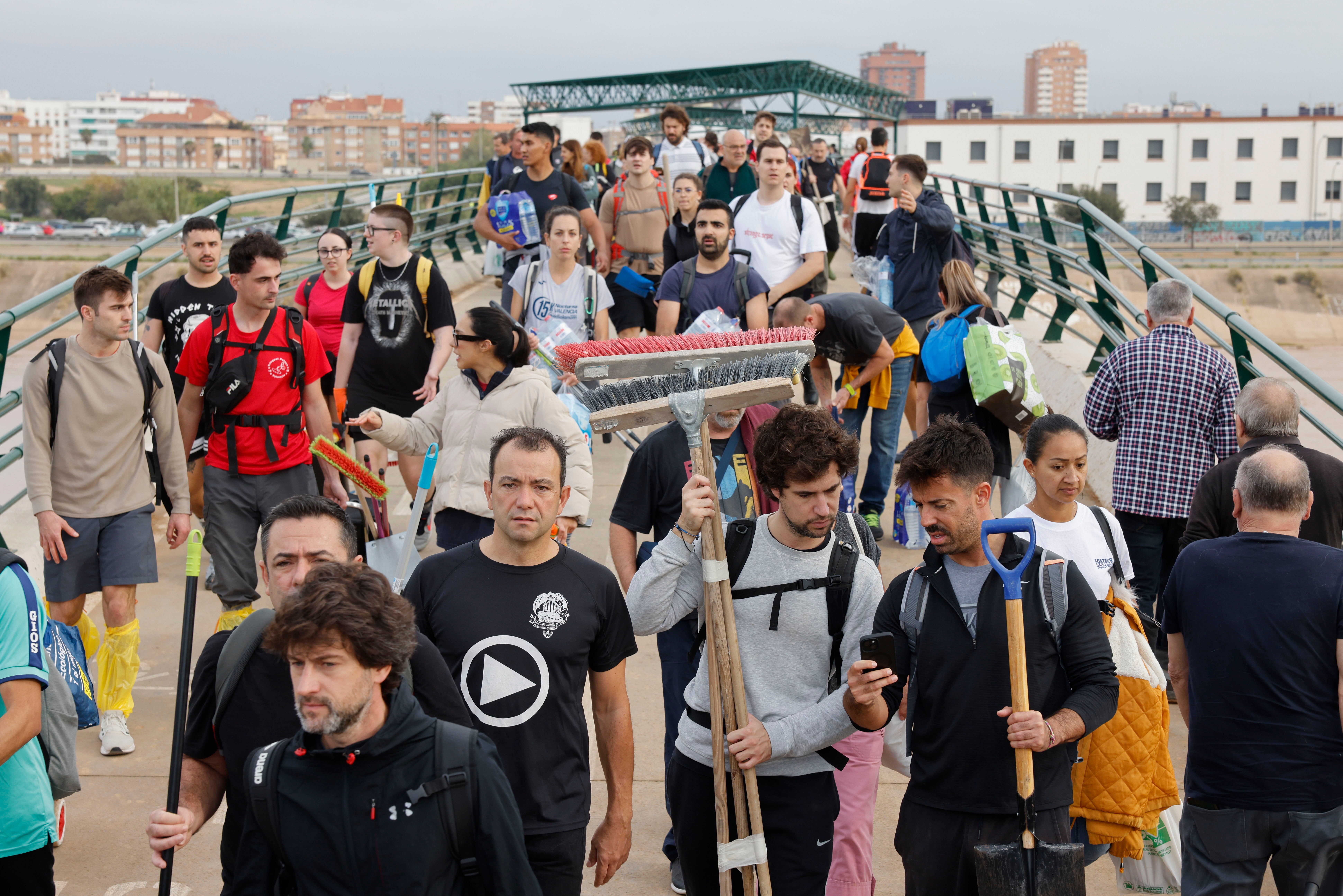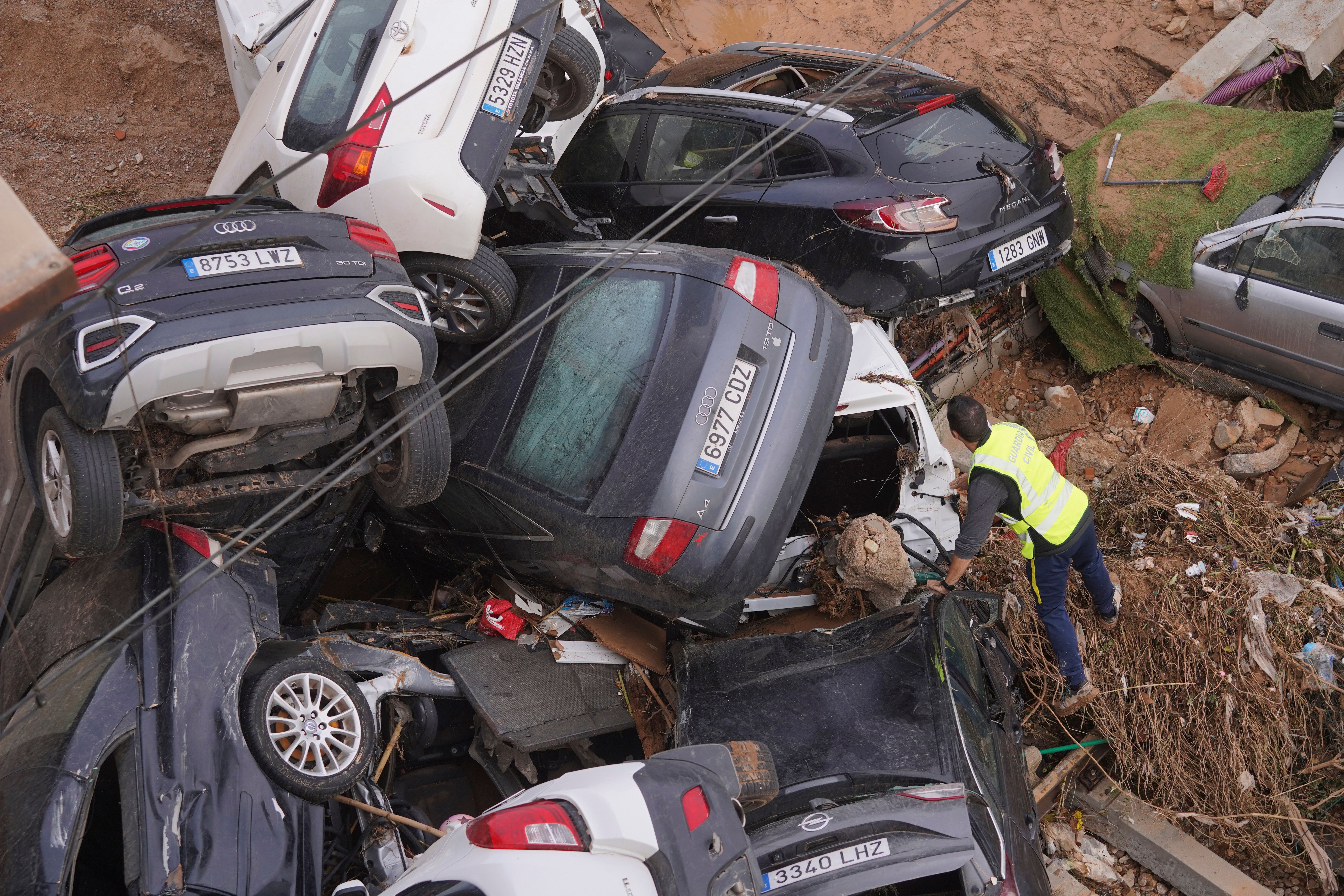Spain floods latest: Deaths soar over 200 in Valencia amid fresh fears of flooding and new rain alert issued
Death toll continues to rise after worst flash floods in three decades sweeps across Spanish region of Valencia
Your support helps us to tell the story
From reproductive rights to climate change to Big Tech, The Independent is on the ground when the story is developing. Whether it's investigating the financials of Elon Musk's pro-Trump PAC or producing our latest documentary, 'The A Word', which shines a light on the American women fighting for reproductive rights, we know how important it is to parse out the facts from the messaging.
At such a critical moment in US history, we need reporters on the ground. Your donation allows us to keep sending journalists to speak to both sides of the story.
The Independent is trusted by Americans across the entire political spectrum. And unlike many other quality news outlets, we choose not to lock Americans out of our reporting and analysis with paywalls. We believe quality journalism should be available to everyone, paid for by those who can afford it.
Your support makes all the difference.The number of those killed in catastrophic flash flooding in Spain has soared to at least 205, as fresh weather warnings for rain prompt fears of further flooding.
The death toll rose significantly on Friday as rescue workers continued to search for missing people. 202 of those killed were in the hardest-hit region of Valencia alone.
Spain’s state weather agency, Aemet, has issued the most severe kind of weather alert in the south west of the country as the province of Huelva was hit by torrential rain.
Those impacted the worst by the flash flooding in eastern Spain are also expecting more rain, as yellow and amber weather warnings remain in place.
The country is in its second day of an official three-day national mourning, with flags at half-mast on official buildings.
Spain’s prime minister Pedro Sanchez urged residents to stay at home as he warned devastation is “not finished” on Thursday and declared the worst impacted province of Valencia a “disaster zone”.
Valencia residents face ‘disaster’ as more rain expected
Skies in Valencia were partially sunny on Friday, but the Spanish weather agency has issued alerts for strong rains in the region as well as the coast of Huelva, Andalusia; Tarragona, in Catalonia; and part of the Balearic Islands.
The storm cut power and water services on Tuesday night, but about 85% of 155,000 affected customers had their power back on by Friday, the utility said in a statement.
“This is a disaster. There are a lot of elderly people who don’t have medicine. There are children who don’t have food. We don’t have milk, we don’t have water. We have no access to anything,” a resident of Alfafar, one of the most affected towns in south Valencia, told state television station TVE. “No one even came to warn us on the first day.”

Is it safe to travel to Spain and should I cancel my holiday after flooding disaster?
Eastern Spain has been hit with devastating flash flooding this week, the worst flooding disaster the area has experienced in decades.
Rainstorms started on Tuesday (29 October) and continued into Wednesday. In the aftermath of the floods, cars have been piled on the street surrounded by a sea of debris from damaged buildings and structures.
At least 158 people have lost their lives after the flooding swept through streets, turning walkways into rivers and trapping people in their homes and on the roofs of cars.
Read the full article here:

Is it safe to travel to Spain? Should I cancel my holiday?
Flooding has severly impacted the Valencia region, with more rain on the way in the the southwest in Huelva
Scientists blame climate change which is ‘turbocharging’ extreme weather
Spain’s Mediterranean coast is used to autumn storms that can cause flooding, but this was the most powerful flash flooding in recent memory. Scientists have linked it to climate change, which is also behind increasingly high temperatures and droughts in Spain and the heating up of the Mediterranean Sea.
“Climate change is turbocharging extreme weather. We can expect to see more of the devastation and the despair that we have been seeing this week as a warming atmosphere brings more energy into our climate system”, said Clare Nullis, a spokesperson for the World Meteorological Organization.
“As a result of rising temperatures, the hydrological cycle has accelerated. It’s also become more erratic, more unpredictable”, she added. “We are facing growing problems of either too much water or too little. And that’s what we’re seeing playing out in Spain at the moment.”
Spain has suffered through an almost two-year drought, making the flooding worse because the dry ground was so hard that it could not absorb the heavy rain.
Storms cause disruption at Barcelona airport
Spain’s air navigation service provider Enaire has warned that “adverse weather” due to the storms is causing disruption to arrivals at Barcelona airport.
In a post on X, Enaire says the situation is being monitored and advises people to check with their airline for updates.
Earlier today, they posted a similar warning for flights arriving at Palma de Mallorca airport.
‘It’s all destroyed’: Aftermath of deadly flash floods in Spain
Huge numbers of volunteers take part in rescue operation
The tragedy has unleashed a wave of solidarity across Spain, with hundreds of residents arriving on foot in the worst affected areas, carrying water, essential products, shovels and brooms to help remove the mud.
The number of people coming to help is so high that the authorities have asked them not to drive or walk there, because they are blocking the roads needed by the emergency services.
“It is very important that you return home,” said regional president Carlos Mazïn, who thanked the volunteers for their goodwill.

Other than volunteer contributions, local governments have begun distributing water, food and basic products in schools, town halls and sports venues.
The Red Cross used its vast network of aid to help those affected by the floods. Since Tuesday, it has carried out more than 3,500 interventions, half of them in 13 of the shelters set up by the authorities, to distribute food, blankets and hygiene products, and to provide internet access.
1,700 soldiers searching for unknown number of missing people
So far, 205 bodies have been recovered — 202 in Valencia, the worst hit region, two in neighboring Castilla La Mancha and one in Andalusia in the south.
Members of the security forces and 1,700 soldiers from the emergency unit are searching for an unknown number of missing people with officials concerned that more bodies could be found in wrecked vehicles and flooded garages.
Guardia Civil has rescued more than 4,500 people trapped by the floods, said Interior Minister Fernando Grande-Marlaska in a news conference from Valencia.
The regional authorities, who are in charge of the response to the tragedy, have asked the central government to mobilize an additional 500 soldiers, who will be deployed on Saturday.
‘UK stands with Spain,’ says Starmer
Prime Minister Sir Keir Starmer has said the “UK stands with Spain” after devastating floods killed more than 200 people with dozens more missing.
My thoughts are with those who have lost their lives, their families and all those affected by the devastation caused by the extreme flooding in Spain. The UK stands with Spain during this difficult time.
Red alert lifted in Spanish region
A red alert in the Spanish region of Huelva has been lifted by the State Meteorological Agency (Aemet), which had been in place since early Friday morning.
Orange warnings have also been lifted in Castellon and Tarragona, while orange warnings remain in place for Huelva and the Balearic Islands.
Situation ‘unbelievable’ with streets filled with debris and vehicles, says local
The damage from the storm has recalled the aftermath of a tsunami, with survivors left to pick up the pieces as they mourn loved ones lost in Spain’s deadliest natural disaster in living memory. Many streets were still blocked by piled-up vehicles and debris, in some cases trapping residents in their homes. Some places still don’t have electricity, running water, or stable telephone connections.
“The situation is unbelievable. It’s a disaster and there is very little help,” said Emilio Cuartero, in Masanasa, on the outskirts of Valencia city. “We need machinery, cranes, so that the sites can be accessed. We need a lot of help. And bread and water.”

In Chiva, residents were clearing debris from mud-filled streets. The Valencian town received more rain in eight hours on Tuesday than it had in the preceding 20 months, and water overflowed a gully that crosses the town, tearing up roads and homes.
The mayor, Amparo Fort, told RNE radio that “entire houses have disappeared, we don’t know if there were people inside or not.”
Subscribe to Independent Premium to bookmark this article
Want to bookmark your favourite articles and stories to read or reference later? Start your Independent Premium subscription today.




Join our commenting forum
Join thought-provoking conversations, follow other Independent readers and see their replies
Comments